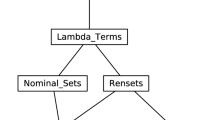Abstract
A general notion of rewriting system of the kind used for evaluating simply typed λ-terms in Scott's PCF is defined. Any simply typed λ-calculus with PCF-like rewriting semantics is shown necessarily to satisfy Milner's Context Lemma. A simple argument demonstrates that any denotational semantics which is adequate for PCF and in which certain simple Boolean functionals exist, cannot be fully abstract for any extension of PCF satisyfing the Context Lemma. An immediate corollary is that Berry's stable domains cannot be fully abstract for any extension of PCF definable by PCF-like rules. Thus, the idea of adding a combinator to PCF analogous to the “parallel-or” combinator which establishes full abstraction for the familiar cpo model cannot be generalized for models such as stable domains.
Supported in part by ARO grant DAAL03-89-G-0071.
Supported in part by ONR grant N00014-89-J-1988 and NSF grant 8819761-CCR.
Preview
Unable to display preview. Download preview PDF.
Similar content being viewed by others
References
S. Abramsky. The lazy lambda calculus. In D. L. Turner, editor, Research Topics in Functional Programming. Addison-Wesley Publishing Co., 1989.
S. Abramsky. Domain theory in logical form. Ann. Pure Appl. Logic, 51:1–77, 1991.
G. Berry. Séquentialité de l'evaluation formelle des lambda-expressions. In B. Robinet, editor, Program Transformations, 3eme Colloque International sur la programmation, pages 67–80, 1978.
G. Berry. Stable models of typed lambda-calculi. In G. Ausiello and C. Böhm, editors, Automata, Languages and Programming: Fifth Colloquium, volume 62 of Lecture Notes in Computer Science, pages 72–89. Springer-Verlag, July 1978.
G. Berry and P.-L. Curien. Sequential algorithms on concrete data structures. Theor. Comput. Sci., 20(3):265–321, July 1982.
G. Berry and P.-L. Curien. Theory and practice of sequential algorithms: the kernel of the programming language CDS. In M. Nivat and J. C. Reynolds, editors, Algebraic Methods in Semantics, chapter 2, pages 35–87. Cambridge Univ. Press, 1985.
G. Berry, P.-L. Curien, and J.-J. Lévy. Full abstraction for sequential languages: the state of the art. In M. Nivat and J. C. Reynolds, editors, Algebraic Methods in Semantics, chapter 3, pages 89–132. Cambridge Univ. Press, 1985.
B. Bloom. Can LCF be topped? Flat lattice models of typed lambda calculus (preliminary report). In Third Annual Symposium on Logic in Computer Science, pages 282–295. IEEE, 1988.
B. Bloom. Can LCF be topped? Flat lattice models of typed λ-calculus. Information and Computation, 87(1/2):263–300, July/Aug. 1990.
B. Bloom, S. Istrail, and A. R. Meyer. Bisimulation can't be traced (preliminary report). In Conference Record of the Fifteenth Annual ACM Symposium on Principles of Programming Languages, pages 229–239, 1988. Also appears as MIT Technical Memo MIT/LCS/TM-345; submitted for journal publication.
A. Bucciarelli and T. Ehrard. Sequentiality and strong stability. In Proceedings, Sixth Annual IEEE Symposium on Logic in Computer Science, 1991. to appear.
P.-L. Curien. Categorical Combinators, Sequential Algorithms and Functional Programming. John Wiley and Sons, 1986.
J.-Y. Girard. The system F of variable types, fifteen years later. Theor. Comput. Sci., 45:152–192, 1986.
D. J. Howe. Equality in lazy computation systems. In Proceedings, Fourth Annual Symposium on Logic in Computer Science, pages 198–203. IEEE, 1989.
G. Huet and J.-J. Lévy. Computations in nonambiguous term rewriting systems. Technical Report 359, INRIA, Rocquencourt, France, 1979.
T. Jim and A. R. Meyer. Communication in the types electronic forum (types@theory.lcs.mit.edu). June 17th, 1989.
G. Kahn and D. B. MacQueen. Coroutines and networks of parallel processes. In B. Gilchrist, editor, Information Processing '77, pages 993–998. North-Holland Publishing Co., 1977.
I. Mason and C. Talcott. Programming, transforming, and proving with function abstractions and memories. In G. Ausiello, M. Dezani-Ciancaglini, and S. R. D. Rocca, editors, Automata, Languages and Programming: 16th International Colloquium, volume 372 of Lecture Notes in Computer Science. Springer-Verlag, 1989.
A. R. Meyer. What is a model of the lambda calculus? Information and Control, 52(1):87–122, Jan. 1982.
A. R. Meyer. Semantical paradigms: Notes for an invited lecture, with two appendices by Stavros Cosmadakis. In Third Annual Symposium on Logic in Computer Science, pages 236–253. IEEE, 1988.
R. Milner. Fully abstract models of the typed lambda calculus. Theor. Comput. Sci., 4:1–22, 1977.
K. Mulmuley. Full Abstraction and Semantic Equivalence. ACM Doctoral Dissertation Award 1986. MIT Press, 1987.
C.-H. L. Ong. The Lazy Lambda Calculus: An Investigation into the Foundations of Functional Programming. PhD thesis, Imperial College, University of London, 1988.
G. D. Plotkin. LCF considered as a programming language. Theor. Comput. Sci., 5(3):223–256, Dec. 1977.
V. Sazonov. Expressibility of functions in D. Scott's LCF language. Algebra i Logika, 15:308–330, 1976. (Russian).
D. S. Scott. A type theoretical alternative to CUCH, ISWIM, OWHY. Manuscript, Oxford Univ., 1969.
D. S. Scott. Continuous lattices. In F. W. Lawvere, editor, Toposes, Algebraic Geometry and Logic, volume 274 of Lecture Notes in Mathematics, pages 97–136. Springer-Verlag, 1972.
D. S. Scott. Data types as lattices. SIAM J. Comput., 5:522–587, 1976.
D. S. Scott. Logic and programming languages. Commun. ACM, 20:634–645, 1977.
S. Smith. From operational to denotational semantics. In Mathematical Foundations of Programming Semantics, 1991. To appear.
A. Stoughton. Fully Abstract Models of Programming Languages. Research Notes in Theoretical Computer Science. Pitman/Wiley, 1988. Revision of Ph.D. thesis, Dept. of Computer Science, Univ. Edinburgh, Report No. CST-40-86, 1986.
C. Strachey. Fundamental concepts in programming languages. Lecture Notes, Int'l. Summer School in Computer Programming, Copenhagen., 1967.
C. Talcott. Programming and proving with function and control abstractions. Technical Report STAN-CS-89-1288, Stanford Univ., 1988.
Author information
Authors and Affiliations
Editor information
Rights and permissions
Copyright information
© 1991 Springer-Verlag Berlin Heidelberg
About this paper
Cite this paper
Jim, T., Meyer, A.R. (1991). Full abstraction and the Context Lemma (preliminary report). In: Ito, T., Meyer, A.R. (eds) Theoretical Aspects of Computer Software. TACS 1991. Lecture Notes in Computer Science, vol 526. Springer, Berlin, Heidelberg. https://doi.org/10.1007/3-540-54415-1_44
Download citation
DOI: https://doi.org/10.1007/3-540-54415-1_44
Published:
Publisher Name: Springer, Berlin, Heidelberg
Print ISBN: 978-3-540-54415-9
Online ISBN: 978-3-540-47617-7
eBook Packages: Springer Book Archive




